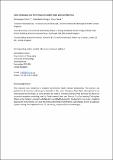Files in this item
Value landscapes and their impact on public water policy preferences
Item metadata
| dc.contributor.author | Schulz, Christopher | |
| dc.contributor.author | Martin-Ortega, Julia | |
| dc.contributor.author | Glenk, Klaus | |
| dc.date.accessioned | 2022-02-09T13:30:21Z | |
| dc.date.available | 2022-02-09T13:30:21Z | |
| dc.date.issued | 2018-11 | |
| dc.identifier | 277619630 | |
| dc.identifier | f1010f9d-019c-4b71-89b9-efb75dbe1ec0 | |
| dc.identifier | 85054804041 | |
| dc.identifier.citation | Schulz , C , Martin-Ortega , J & Glenk , K 2018 , ' Value landscapes and their impact on public water policy preferences ' , Global Environmental Change , vol. 53 , pp. 209-224 . https://doi.org/10.1016/j.gloenvcha.2018.09.015 | en |
| dc.identifier.issn | 0959-3780 | |
| dc.identifier.uri | https://hdl.handle.net/10023/24835 | |
| dc.description | This research was funded by a Scottish Government Hydro Nation Scholarship. | en |
| dc.description.abstract | A growing body of research suggests that people’s values may be important predictors of their preferences regarding water governance and policy. However, this assertion is rarely tested empirically. The present study summarises the results of a large-scale quantitative study on the link between public water policy preferences and people’s values, based on data from a representative sample of the general population collected in a household survey in the Upper Paraguay River Basin, Mato Grosso, Brazil (n=1067). Structural equation modelling is applied to represent the clusters of values, or ‘value landscapes’, that shape attitudes and water policy preferences, in this case, for or against the construction of the highly controversial Paraguay-Paraná Waterway across the Pantanal wetland. Results demonstrate that opponents of the waterway share a value landscape composed of closely related self-transcendence values, democratic governance-related values, and ecological and cultural water values, whereas supporters hold self-enhancement values, economic governance-related values, and economic water values. Beyond this individual case study and beyond water governance, our findings may explain the protracted nature of, and seeming impossibility to resolve, environmental conservation vs. economic development conflicts more broadly. | |
| dc.format.extent | 1571634 | |
| dc.language.iso | eng | |
| dc.relation.ispartof | Global Environmental Change | en |
| dc.subject | Environmental values | en |
| dc.subject | Value landscapes | en |
| dc.subject | Political legitimacy | en |
| dc.subject | Water governance | en |
| dc.subject | Development | en |
| dc.subject | Paraguay-Paraná Waterway | en |
| dc.subject | Pantanal | en |
| dc.subject | Mato Grosso | en |
| dc.subject | G Geography (General) | en |
| dc.subject | E-NDAS | en |
| dc.subject | SDG 8 - Decent Work and Economic Growth | en |
| dc.subject.lcc | G1 | en |
| dc.title | Value landscapes and their impact on public water policy preferences | en |
| dc.type | Journal article | en |
| dc.contributor.institution | University of St Andrews. School of Geography & Sustainable Development | en |
| dc.identifier.doi | 10.1016/j.gloenvcha.2018.09.015 | |
| dc.description.status | Peer reviewed | en |
| dc.date.embargoedUntil | 2019-11-01 | |
| dc.identifier.url | https://www.repository.cam.ac.uk/handle/1810/286904 | en |
This item appears in the following Collection(s)
Items in the St Andrews Research Repository are protected by copyright, with all rights reserved, unless otherwise indicated.

